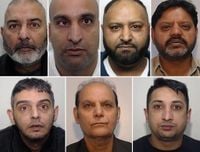Seven men who were part of a notorious Rochdale grooming gang have been sentenced to more than 170 years in prison, bringing a measure of long-awaited justice to two survivors of horrific abuse that spanned from 2001 to 2006. The sentencing, handed down by a Manchester court on October 2, 2025, marks a significant chapter in the ongoing reckoning with historical child sexual exploitation in the United Kingdom—a reckoning that has exposed institutional failures, ignited political controversy, and left entire communities grappling with the aftermath.
The ringleader, Mohammed Zahid, a 64-year-old market trader, received the longest sentence: 35 years behind bars. His six accomplices—Kasir Bashir, Mushtaq Ahmed, Roheez Khan, Mohammed Shahzad, Nisar Hussain, and Naheem Akram—were each given prison terms ranging from 12 to 29 years, according to BBC and Sky News. All seven men, of Pakistani origin and hailing from Rochdale, Oldham, or Crumpsall, were convicted of a total of 50 child sexual offences, including multiple counts of rape, indecency with a child, and assault by penetration. The gravity of the crimes was matched only by the systematic nature of the abuse, which saw two vulnerable teenage girls, both just 13 years old at the start, manipulated and exploited over several years.
The victims, known in court as Girl A and Girl B, came from deeply troubled backgrounds—one living in a local children’s home, the other from a dysfunctional family environment. Prosecutors described how the men initially gained their trust with gifts, money, and offers of shelter, only to later ply them with alcohol and drugs and subject them to sexual violence at various locations around the town. The abuse was relentless. The girls were "passed around for sex, abused, degraded, and then discarded," as Judge Jonathan Seely put it, with the men expecting sex “whenever and wherever” they wished—in filthy flats, cars, car parks, alleyways, and disused warehouses.
During the three-day sentencing hearing, both survivors delivered searing impact statements. One explained how the abuse had affected every aspect of her life, from her mental and physical health to her ability to form healthy relationships. The other said she once believed all men would expect sex from her, but urged other victims to come forward, no matter how much time had passed. Their courage, echoed by investigators and advocates alike, was pivotal in bringing the perpetrators to justice. "My voice matters because I was believed," one survivor said, as reported by Greater Manchester Police (GMP).
The investigation that led to these convictions was anything but straightforward. GMP’s specialist Child Sexual Exploitation Major Investigations Team (CSE MIT) described their work as “complex” and “meticulous,” involving thousands of hours of detective work and close collaboration with partner agencies. Detective Chief Inspector Guy Laycock, the senior investigating officer, paid tribute to the survivors and the investigative team: “These seven men preyed on vulnerability for their own depraved sexual gain. They had a callous disregard for these women when they were girls and continue to show no remorse for their unforgivable actions all these years later. The team of dedicated investigators on this case have put thousands of hours into securing this outcome.”
Yet, even as the court delivered its verdicts, the story was not entirely one of closure. Kasir Bashir, one of the convicted men, remains at large after failing to appear for his trial in January 2025. Despite having complied with bail conditions until January 8, Bashir disappeared just before proceedings began at Manchester Minshull Street Crown Court. He was convicted in absentia of multiple counts of rape and indecency with a child and sentenced to 29 years. GMP has launched a manhunt, suspecting he may have fled the country illegally. Detective Chief Inspector Laycock was unequivocal: “We will do all we can to find Bashir and ensure justice is fully served for them. Time was no barrier to bringing these groomers to justice, and Bashir evading the trial will not stop us ensuring he now faces the full consequences of his actions.”
The Rochdale case is not an isolated incident. Over the past decade, two major investigations in the town have resulted in 32 offenders being convicted and jailed for a collective 474 years. Operation Lytton, one of the largest inquiries, saw 12 men convicted of 72 offences, and another 20 men are due to stand trial in the coming weeks. The scale of the problem is sobering: a 2014 report estimated that at least 1,400 victims may have been exploited by men primarily of Pakistani heritage in similar cases across the UK. In Rotherham alone, around 1,400 girls were abused between 1997 and 2013, according to multiple investigative reports cited by The Telegraph and Sky News.
But the legacy of these crimes goes beyond individual perpetrators. Local authorities and the Greater Manchester Police have publicly admitted to serious failures in their duty to protect victims. In April 2022, GMP’s chief constable, Stephen Watson, described the force’s earlier handling of the issue as “borderline incompetent.” A government-commissioned report that same year criticized both police and local councils for downplaying the ethnic dimensions of child sexual exploitation, contributing to a climate in which victims were not believed and offenders acted with impunity. Prosecutor Rossano Scamardella told the court that Zahid “was confident that nothing would be done about it… Such was the brazen way he did this that by the end of the abuse, he felt almost untouchable. People knew, authorities knew. And nothing was done.”
These failings have fed into wider political and social debates. The issue of "grooming gangs" has become a touchstone for far-right groups, who have used it to demonize British Asians and Muslims, often ignoring the fact that the vast majority of sexual offences in the UK are committed by white men. Public discourse reached fever pitch earlier this year when US tech billionaire Elon Musk accused Prime Minister Keir Starmer of complicity due to his former role as head of the Crown Prosecution Service. While the government rejected these allegations, the controversy reignited calls for a national inquiry. Starmer, initially insisting that recommendations from previous inquiries needed to be implemented, later agreed that a new, transparent inquiry would help restore public confidence. "That, to me, is a practical, common-sense way of doing politics," Starmer told the BBC.
Baroness Louise Casey’s preliminary report in June 2025 highlighted the lack of robust data on the issue, making it difficult to determine whether any ethnic group was overrepresented among offenders. “If you look at the data on child exploitation, suspects and offenders, it is disproportionately Asian heritage,” Casey noted. “If you look at the data for child abuse, it is not disproportionate, and it is white men.” Then-Home Secretary Yvette Cooper affirmed the government’s commitment to implementing the report’s recommendations, including strengthening rape laws and child protection. "While much more robust national data is needed, we cannot and must not shy away from these findings, because, as Baroness Casey says, ignoring the issues, not examining and exposing them to the light, allows the criminality and depravity of a minority of men to be used to marginalise whole communities."
For the survivors in Rochdale, the sentences handed down this week are a powerful acknowledgment of their suffering and resilience. Yet, as the ongoing search for Bashir and the upcoming trials show, the pursuit of justice—and the broader reckoning with institutional failure—remains unfinished.


